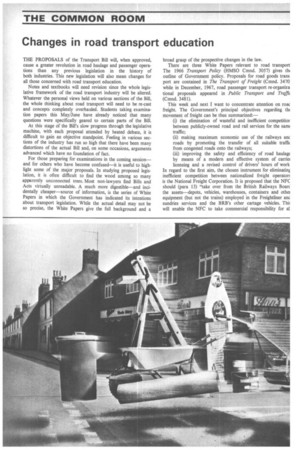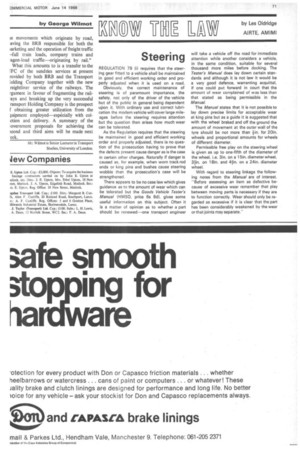Changes in road transport education
Page 72

Page 73

If you've noticed an error in this article please click here to report it so we can fix it.
THE PROPOSALS of the Transport Bill will, when approved, cause a greater revolution in road haulage and passenger operations than any previous legislation in the history of both industries. This new legislation will also mean changes for all those concerned with road transport education.
Notes and textbooks will need revision since the whole legislative framework of the road transport industry will be altered. Whatever the personal views held on various sections of the Bill, the whole thinking about road transport will need to be re-cast and concepts completely overhauled. Students taking examination papers this May/June have already noticed that many questions were specifically geared to certain parts of the Bill.
At this stage of the Bill's slow progress through the legislative machine, with each proposal attended by heated debate, it is difficult to gain an objective standpoint. Feeling in various sections of the industry has run so high that there have been many distortions of the actual Bill and, on some occasions, arguments advanced which have no foundation of fact.
For those preparing for examinations in the coming session— and for others who have become confused—it is useful to highlight some of the major proposals. In studying proposed legislation, it is often difficult to find the wood among so many apparently unconnected trees. Most non-lawyers find Bills and Acts virtually unreadable. A much more digestible—and incidentally cheaper—source of information, is the series of White Papers in which the Government has indicated its intentions about transport legislation. While the actual detail may not be so precise, the White Papers give the full background and a broad grasp of the prospective changes in the law.
There are three White Papers relevant to road transport The 1966 Transport Policy (HMSO Cmnd. 3057) gives the outline of Government policy. Proposals for road goods trans port are contained in The Transport of Freight (Cmnd. 34701 while in December, 1967, road passenger transport re-organiza tional proposals appeared in Public Transport and Trqffl.( (Cmnd. 3481).
This week and next I want to concentrate attention on roac freight. The Government's principal objectives regarding the movement of freight can be thus summarized:— (i) the elimination of wasteful and inefficient competitior between publicly-owned road and rail services for the same traffic; (ii) making maximum economic use of the railways ant roads by promoting the transfer of all suitable traffit from congested roads onto the railways; (iii) improving the safety and efficiency of road haulage by means of a modern and effective system of earriei
licensing and a revised control of drivers' hours of work In regard to the first aim, the chosen instrument for eliminatini inefficient competition between nationalized freight operator is the National Freight Corporation. It is proposed that the NFC should (para 13) "take over from the British Railways Boar the assets—depots, vehicles, warehouses, containers and °the' equipment (but not the trains) employed in the Freightliner anc sundries services and the BRB's other cartage vehicles. Tith will enable the NFC to take commercial responsibility for al
ie movements which originate by road, :aving the BRB responsible for both the iarketing and the operation of freight traffic –full train loads, company trains and • agon-load traffic—originating by rail." What this amounts to is a transfer to the 1FC of the sundries services at present rovided by both BRB and the Transport folding Company together with the new reightliner service of the railways. The rgument in favour of fragmenting the rail'ays and breaking up the very successful ransport Holding Company is the prospect F obtaining greater utilization from the luipment employed—especially with colction and delivery. A summary of the [overnment proposals for achieving the cond and third aims will be made next • eek.
Mr. Wilmot is Senior Lecturer in Transport Studies, University of London.




























































































































